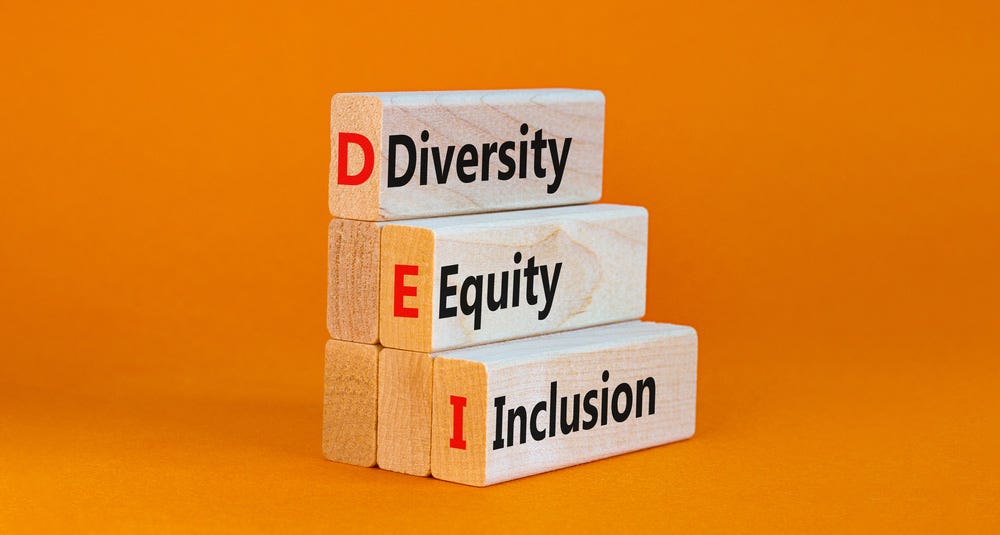The DEI Cake Is Baked
"Though DEI has been politicized a great deal since its inception and adoption, it is now here to stay — particularly in the private sector. Attempts to block or disrupt DEI efforts will fail."
By Dan W. Goldfine
Who between the two following job candidates is more qualified for a single open position with a top Chicago law firm?
Janeé
Janeé was born in the Henry Horner Homes (so notoriously dangerous a public housing project that the City of Chicago destroyed it). Janeé had to worry for her life walking down the center corridor of the Homes or sitting in her front room because of intentional and random shootings. It was not safe to walk from the bus or the L train stop or to go to the neighborhood school. No food, or unhealthy food at home. Terrible public schools, and an unsafe high school deficient in every way. Yet, Janeé successfully completes high school, also scoring well on her SATs — without any SAT prep course. She matriculates to the University of Illinois, where she works jobs to pay for her tuition, room and board. During undergrad, she maintains her academic success and, without taking an LSAT preparation course, is admitted to the University of Illinois law school. There, still working to pay tuition, room and board, Janeé is successful. After law school, she clerks for a federal judge in Illinois and is then hired by the DOJ as a Trial Attorney.
As it happens, Janeé has had the same experience and achieved the same level of success at the DOJ as this author, Dan.
Dan (me)
I was ‘born on third base.’ My Dad was a successful businessman in a 100,000-person city. One of the largest private employers. A man of great civic stature (e.g., buildings named after him, thousands attended his memorial). My Dad made things easy for me. I never feared for my life. Always had healthy food on the table (except for liver). Tutors. Sports camps. Great public schools. I attended an excellent private high school. SAT preparation courses. Although I went to a public university, my dad helped me to get into an Ivy League University. LSAT courses. The best law school in Minnesota (but I also was admitted to the best law school in New York). An introduction to a powerful federal judge in Minnesota, leading to a clerkship. That clerkship led to a position as a Trial Attorney with the U.S. Department of Justice in Chicago. Both jobs I could only take because my Dad ensured that I had no debt.
So, who is more qualified? Objectively, Janeé is. And today, with a mortal certainty, the great Chicago law firm is hiring Janeé and discarding me. Janeé’s path to the job interview demonstrates that she was a stronger candidate than I was. It is not her skin color, her gender, or her faith. Subjectively, the interviewers may believe I was a better candidate. But will that matter? Should that matter?
Even if Janeé had been marginally-less qualified than me, the law firm is hiring her. From a risk-averse view, this is the best decision for the law firm.
Diversity, equity and inclusion (DEI) has become entrenched in American business. Mckinsey Company defines DEI as “three closely linked values held by many organizations that are working to be supportive of different groups of individuals, including people of different races, ethnicities, religions, abilities, genders, and sexual orientations.”
Though DEI has been politicized a great deal since its inception and adoption over the last several years, it is here to stay — particularly in the private sector. Attempts to interfere with or disrupt DEI efforts will fail. Private businesses are fully vested in DEI. Perhaps not all of them willingly quite yet, but the DEI cake is baked.
It is possible that a very conservative (and pro-business) Supreme Court might cut DEI at the margins when it involves private and public universities, but even this SCOTUS generally will not order private businesses to hire specific types of people, including forcing them to hire Caucasian men, nor how to operate their businesses.
American businesses want the best workforces they can develop at the lowest cost. Failure to recruit among diverse employees means they are not hiring the best, and, by excluding diverse workers, the law of supply and demand means businesses will have to incur higher costs. No business will intentionally pursue unfair or inequitable practices. There is no upside, and the public relations hit would be enormous. Once a diverse workforce is hired, any company that doesn’t include diverse viewpoints into its decision-making will not be maximizing the company’s own capabilities to the fullest.
Of course, these principles are affirmations and axiomatic. There will always be exceptions and false positives. But these principles are at their essence, core elements of the free market. Hiring the best employees, treating all workers fairly and including them in decisions and business opportunities to maximize profits have been central to the success of the free market in the US.
There are many ways to maximize a business’ success via DEI efforts. One such way — acknowledged even by this Supreme Court — is to recognize and give import to where people come from and their journey. Both matter.
DEI advocates — frankly, senior and middle managers — at businesses will be able to isolate paths like the path that Janeé took to hire diverse candidates and to ensure that diverse candidates are promoted. This will ensure that DEI becomes more and more entrenched. Over time, this entrenchment will build upon itself – without any need for court or government intervention.
Don’t be fooled by angry rhetoric or simplistic political labels. DEI may claim a moral authority by supporting job candidates who have traveled a tougher road — what many people define as ‘fairness.’ But the end result will be a practical one for any organization that wants to continue innovating and succeeding.
Once you look at it closely, it’s pretty easy to see the win-win.
DAN W. GOLDFINE is an attorney at the international law firm Dickinson Wright and a former Federal Prosecutor at the U.S. Department of Justice, Antitrust Division.
**EDITOR’S NOTE: Though the author’s article does not focus on DEI as it pertains to growing antisemitism on American college campuses (even prior to October 7), JEWDICIOUS is obligated to note this is an important debate. Readers who would like to learn more about the impacts that DEI has been alleged of generating may reference the following links:
“End DEI” - Bari Weiss, Tablet
“Why DEI Programs Can’t Address Antisemitism” - Tammi Rossman Benjamin, Sapir
“Jewish Critics of DEI Debate the Future of US Campus Diversity” - Times of Israel
“DEI Drives Campus Antisemitism” - Heather MacDonald, Wall Street Journal
“Addressing Campus Antisemitism Is a Now or Never Moment for DEI” - Matthew Mayhew, Forbes
From unpacking history and politics to navigating the nuances of family and personal relationships to finding the human angle on sports and entertainment — plus our unsparing take on what’s happening in the Jewish world — the canvas at JEWDICIOUS is limitless! JOIN US!!





